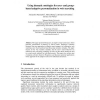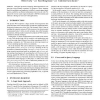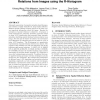140
click to vote
IJCAI
2003
15 years 3 months ago
2003
Emerging Web standards promise a network of heterogeneous yet interoperable Web Services. Web Services would greatly simplify the development of many kinds of data integration and...
130
click to vote
IKE
2004
15 years 3 months ago
2004
In Geoscience domain, large amounts of data are accessible, however they vary in formats and are stored at various organizations leading to problems of data discovery, data intero...
105
click to vote
EON
2007
15 years 3 months ago
2007
Detecting quality problems in semantic metadata is crucial for ensuring a high quality semantic web. Current approaches are primarily focused on the algorithms used in semantic met...
129
click to vote
AMR
2008
Springer
15 years 3 months ago
2008
Springer
This paper presents Prospector, an adaptive meta-search layer, which performs personalized re-ordering of search results. Prospector combines elements from two approaches to adapti...
110
click to vote
ESWS
2006
Springer
15 years 5 months ago
2006
Springer
Blogging, as a subset of the web as a whole, can benefit greatly from the addition of semantic metadata. The result -- which we will call Semantic Blogging -- provides improved cap...
116
click to vote
VLDB
2004
ACM
15 years 7 months ago
2004
ACM
Information retrieval over semantic metadata has recently received a great amount of interest in both industry and academia. In particular, discovering complex and meaningful rela...
108
click to vote
ECAI
2004
Springer
15 years 7 months ago
2004
Springer
This paper presents an ontology-based approach for web querying, using semantic metadata. We propose a query language based on ontologies and emphasize its ability to express appro...
124
click to vote
JCDL
2004
ACM
15 years 7 months ago
2004
ACM
Automatic generation of semantic metadata describing spatial relations is highly desirable for image digital libraries. Relative spatial relations between objects in an image conv...
119
click to vote
ICALT
2006
IEEE
15 years 8 months ago
2006
IEEE
Proper reuse of learning objects depends both on the amount and quality of attached semantic metadata such as “learning objective”', “related concept”, etc. Manually ...
115
click to vote
ECTEL
2007
Springer
15 years 8 months ago
2007
Springer
Folksonomies provide a free source of keywords describing web resources, however, these keywords are free form and unstructured. In this paper, we describe a novel tool that conver...



